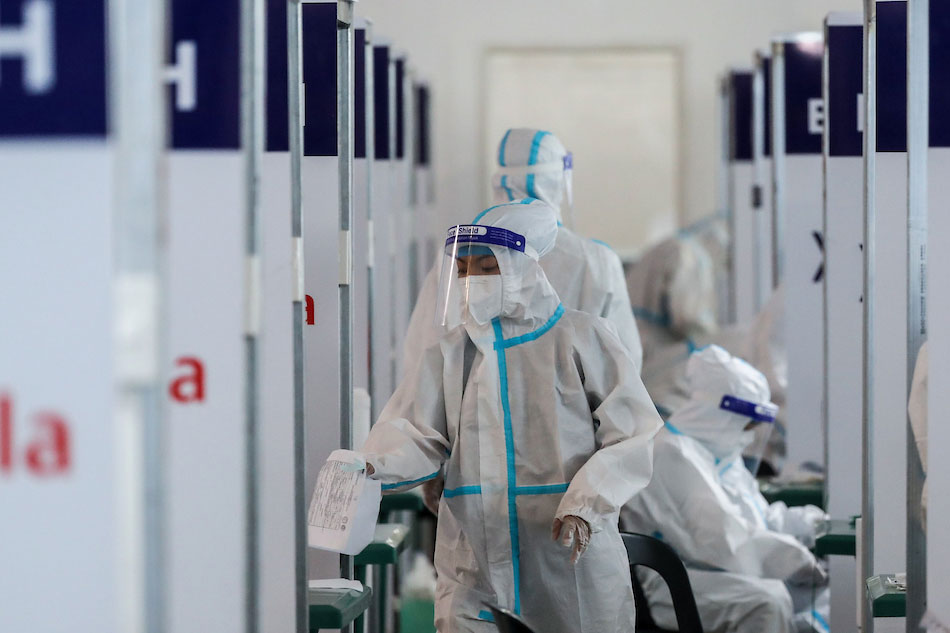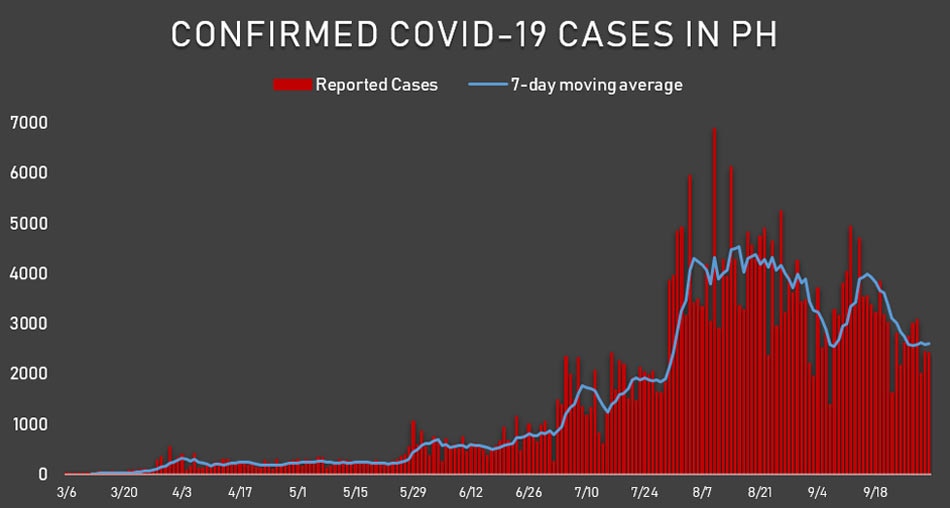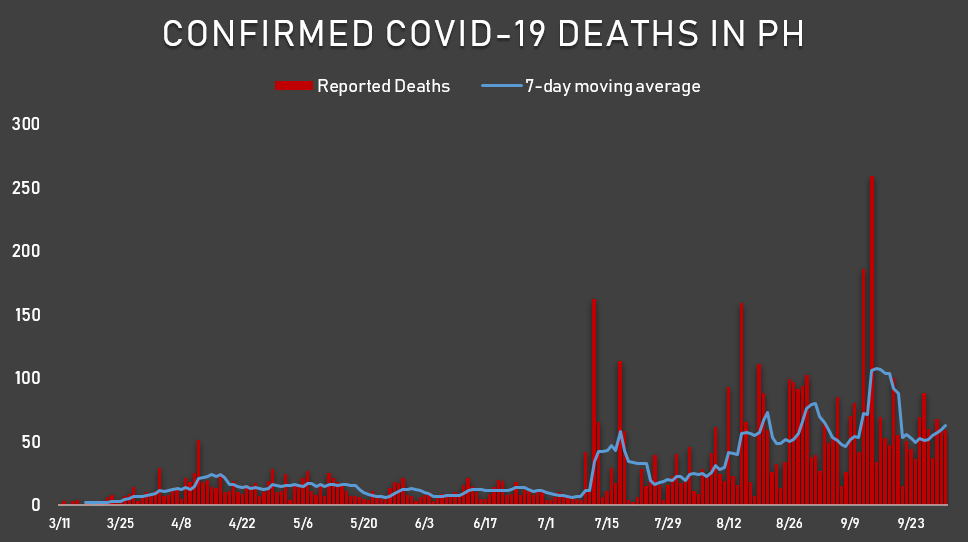COVID-19 pandemic in PH in September: Response improves, but testing stalls while total cases hit 2 grave milestones | ABS-CBN
ADVERTISEMENT

Welcome, Kapamilya! We use cookies to improve your browsing experience. Continuing to use this site means you agree to our use of cookies. Tell me more!
COVID-19 pandemic in PH in September: Response improves, but testing stalls while total cases hit 2 grave milestones
COVID-19 pandemic in PH in September: Response improves, but testing stalls while total cases hit 2 grave milestones
Warren de Guzman,
Edson Guido,
ABS-CBN News
Published Oct 02, 2020 07:19 PM PHT
|
Updated Oct 03, 2020 12:45 AM PHT
MANILA -- The Philippines limped into the fourth quarter of this COVID-19-riddled 2020, bruised and battered from a prolonged battle with the pandemic. As in previous months, the government was able to make some headway in certain aspects of the fight against the virus. But the Philippines also hit a few grave milestones.
MANILA -- The Philippines limped into the fourth quarter of this COVID-19-riddled 2020, bruised and battered from a prolonged battle with the pandemic. As in previous months, the government was able to make some headway in certain aspects of the fight against the virus. But the Philippines also hit a few grave milestones.
The ABS-CBN Data Analytics Team monitored data coming out of the Philippines' Department of Health (DOH) throughout September. Here is what was found.
The ABS-CBN Data Analytics Team monitored data coming out of the Philippines' Department of Health (DOH) throughout September. Here is what was found.
CONFIRMED COVID-19 CASES IN PH
Daily confirmed COVID-19 cases were actually lower in September compared to August. About 3,000 confirmed cases were reported every day in September, compared to August’s average of over 4,100. The last few days of September going into October 1 were also very encouraging, with the Department of Health (DOH) reporting less than 2,500 cases for three straight days. This last happened in July.
Daily confirmed COVID-19 cases were actually lower in September compared to August. About 3,000 confirmed cases were reported every day in September, compared to August’s average of over 4,100. The last few days of September going into October 1 were also very encouraging, with the Department of Health (DOH) reporting less than 2,500 cases for three straight days. This last happened in July.
Given these figures, the decision to maintain the general community quarantine over the National Capital Region and other key areas would appear conservative. This is understandable, as nobody wants a repeat spike similar to what happened in July, which forced a return to stricter quarantine conditions in Metro Manila in August.
Given these figures, the decision to maintain the general community quarantine over the National Capital Region and other key areas would appear conservative. This is understandable, as nobody wants a repeat spike similar to what happened in July, which forced a return to stricter quarantine conditions in Metro Manila in August.
ADVERTISEMENT
CONFIRMED COVID-19 CASES IN PH
- Reported cases - Total Cases
CONFIRMED COVID-19 CASES IN PH
- Reported cases - Total Cases
The slowdown in daily confirmed cases is very welcome, considering total cases breached the 100,000 and 200,000 levels in August alone. Total cases reported in September amounted to about 91,000. Sadly, that was still enough to push the Philippines’ total confirmed COVID-19 cases to over 300,000 at the end of September.
The slowdown in daily confirmed cases is very welcome, considering total cases breached the 100,000 and 200,000 levels in August alone. Total cases reported in September amounted to about 91,000. Sadly, that was still enough to push the Philippines’ total confirmed COVID-19 cases to over 300,000 at the end of September.
This set the stage for the Philippines entering the top 20 list of countries with the highest number of COVID-19 cases on October 1, based on data from Johns Hopkins University.
This set the stage for the Philippines entering the top 20 list of countries with the highest number of COVID-19 cases on October 1, based on data from Johns Hopkins University.
There are arguments being made that the number of confirmed cases globally may be grossly understated, and this goes back to the issue of data collection. The Philippines has made headway in terms of testing, data accuracy, and data completeness. But new data suggest efforts in this space have waned.
There are arguments being made that the number of confirmed cases globally may be grossly understated, and this goes back to the issue of data collection. The Philippines has made headway in terms of testing, data accuracy, and data completeness. But new data suggest efforts in this space have waned.
NUMBER OF TESTS CONDUCTED DAILY
Rather than go up, the number of tests conducted daily has actually gone down in the second half of September, as shown in the bar graph and the 7-day moving average represented by the broken line. Total tests conducted are still up month on month, hitting 1,110,859 in September from 1,078,506 in August. The daily average for September also hit 37,029, from 34,791 the month before. But this was a function of aggressive testing at the start of the month, with the highest daily total hitting 46,597. That effort was not sustained.
Rather than go up, the number of tests conducted daily has actually gone down in the second half of September, as shown in the bar graph and the 7-day moving average represented by the broken line. Total tests conducted are still up month on month, hitting 1,110,859 in September from 1,078,506 in August. The daily average for September also hit 37,029, from 34,791 the month before. But this was a function of aggressive testing at the start of the month, with the highest daily total hitting 46,597. That effort was not sustained.
ADVERTISEMENT
Testing statistics on September 30:
- 32,694 tests
- 2,378 positives reported by labs
- 7.8% daily positivity rate, less than 9% for the 12th straight day ✅
- Cumulative positivity rate is 10.25%
- 158 testing backlogs
- 362,613 positives (Sep 30)
- 314,079 confirmed (Oct 1) pic.twitter.com/Ow3tPhv5eO
— Edson (@EdsonCGuido) October 1, 2020
Testing statistics on September 30:
— Edson (@EdsonCGuido) October 1, 2020
- 32,694 tests
- 2,378 positives reported by labs
- 7.8% daily positivity rate, less than 9% for the 12th straight day ✅
- Cumulative positivity rate is 10.25%
- 158 testing backlogs
- 362,613 positives (Sep 30)
- 314,079 confirmed (Oct 1) pic.twitter.com/Ow3tPhv5eO
The DOH was also able to cut down on testing backlogs or the “number of samples without validated results released within 48 hours after receipt.” But this might also be a function of the ‘plateauing’ effort in overall testing. If there are less tests to conduct and confirm, efficiency naturally increases.
The DOH was also able to cut down on testing backlogs or the “number of samples without validated results released within 48 hours after receipt.” But this might also be a function of the ‘plateauing’ effort in overall testing. If there are less tests to conduct and confirm, efficiency naturally increases.
DAILY POSITIVITY RATE
Despite the slowdown in testing, the daily positivity rate, which measures the daily positive COVID-19 individuals against the number of individuals tested daily, has actually declined. The positivity rate of September averaged out at 9.3%, compared to August’s 12.2%. This is another very welcome development, but there is more work to be done to beat the pandemic. The World Health Organization says a daily positivity rate of 5% should do the trick.
Despite the slowdown in testing, the daily positivity rate, which measures the daily positive COVID-19 individuals against the number of individuals tested daily, has actually declined. The positivity rate of September averaged out at 9.3%, compared to August’s 12.2%. This is another very welcome development, but there is more work to be done to beat the pandemic. The World Health Organization says a daily positivity rate of 5% should do the trick.
CONFIRMED COVID-19 DEATHS IN PH
Confirmed COVID-19 deaths however have gone up. Nearly 2,000 total deaths were announced in September, from 1,565 in August. 259 deaths were reported on September 14 alone, of which 253 were previously tagged as recovered. This again points to data collection and accuracy issues which can fuel doubt regarding the daily reported numbers of the DOH.
Confirmed COVID-19 deaths however have gone up. Nearly 2,000 total deaths were announced in September, from 1,565 in August. 259 deaths were reported on September 14 alone, of which 253 were previously tagged as recovered. This again points to data collection and accuracy issues which can fuel doubt regarding the daily reported numbers of the DOH.
There is also the sad matter of COVID-19 patients dying without proper hospital care, which we discussed in detail in an earlier article.
There is also the sad matter of COVID-19 patients dying without proper hospital care, which we discussed in detail in an earlier article.
ICU BEDS DEDICATED FOR COVID-19 PATIENTS
There should be no problem with hospital capacity at this point. September data show Intensive Care Unit (ICU) beds dedicated for COVID-19 patients across the Philippines are now mostly vacant. Only one region, CARAGA in Mindanao, has an occupancy rate above the DOH danger zone demarcation line pegged at 70%. That might even be attributed to the small sample size. The CARAGA administrative region only has 27 ICU beds. The rest of the regions have hospital space to spare.
There should be no problem with hospital capacity at this point. September data show Intensive Care Unit (ICU) beds dedicated for COVID-19 patients across the Philippines are now mostly vacant. Only one region, CARAGA in Mindanao, has an occupancy rate above the DOH danger zone demarcation line pegged at 70%. That might even be attributed to the small sample size. The CARAGA administrative region only has 27 ICU beds. The rest of the regions have hospital space to spare.
ADVERTISEMENT
ICU BED OCCUPANCY RATE (%)
Population and economic hubs which were previously in that ICU bed occupancy danger zone have also improved their situation in September. NCR, Central Visayas, and CALABARZON are all trending away from the 70% mark. The NCR however is still closer to it compared to Regions 7 and 4-A.
Population and economic hubs which were previously in that ICU bed occupancy danger zone have also improved their situation in September. NCR, Central Visayas, and CALABARZON are all trending away from the 70% mark. The NCR however is still closer to it compared to Regions 7 and 4-A.
CONFIRMED COVID-19 CASES IN NCR
That said, the situation in NCR has actually improved. Total confirmed COVID-19 cases in the capital have gone down. From September 29 to October 1 confirmed cases in the NCR were below 1,000. The last time that happened for three straight days was in mid-July. That is great news, as the NCR is the epicenter of the pandemic in the Philippines, and a major distribution and transportation hub. Beating the virus here could effectively end the pandemic for the country, and would be a huge boost to the Philippine economy.
That said, the situation in NCR has actually improved. Total confirmed COVID-19 cases in the capital have gone down. From September 29 to October 1 confirmed cases in the NCR were below 1,000. The last time that happened for three straight days was in mid-July. That is great news, as the NCR is the epicenter of the pandemic in the Philippines, and a major distribution and transportation hub. Beating the virus here could effectively end the pandemic for the country, and would be a huge boost to the Philippine economy.
SHARE OF NCR CASES TO DAILY TOTAL
From 57% in August, the NCR’s percentage contribution to the Philippines’ total cases fell to 44% in September, and has been consistently below 40% over the last few days of the month.
From 57% in August, the NCR’s percentage contribution to the Philippines’ total cases fell to 44% in September, and has been consistently below 40% over the last few days of the month.
It is good to see the government making an effort to stay prudent and conservative despite clear gains shown in the DOH data. The decision to retain General Community Quarantine or GCQ over the NCR and other areas in October was no doubt a painful one, especially with the government counting on a revival of economic vibrancy in the final quarter of 2020. That is comforting, considering there are persisting issues with data collection and accuracy. But there is always room for improvement. A slowdown in reported cases, and a lower positivity rate accompanied by an even wider and consistent testing effort would be much more convincing.
It is good to see the government making an effort to stay prudent and conservative despite clear gains shown in the DOH data. The decision to retain General Community Quarantine or GCQ over the NCR and other areas in October was no doubt a painful one, especially with the government counting on a revival of economic vibrancy in the final quarter of 2020. That is comforting, considering there are persisting issues with data collection and accuracy. But there is always room for improvement. A slowdown in reported cases, and a lower positivity rate accompanied by an even wider and consistent testing effort would be much more convincing.
Read More:
coronavirus
COVID-19
September 2020
Philippines coronavirus Top 20
testing
deaths
data analytics
health
ADVERTISEMENT
ADVERTISEMENT













